Shadow is going quite well, recently.
Suspiciously well, you might say. I’m closer to the end of Part II then the start of it, and Part II was probably the section I thought would be hardest to write. If anything, it’s the most straightforward part of the novel in terms of plot – the Argo has left the kingdom of Thessaly behind it, but makes several stops on the long and laborious path to Colchis, leading Jason and the Argonauts to have a series of ‘adventures’ in each locale. Each of these is well-documented in more than one Ancient source, leaving a generally accepted framework of the story of the Golden Fleece. Details change from writer to writer, but the story, more or less, remains the same.
Storywise, this middle act was probably the most straightforward. But in terms of character development, I felt like the novel was going to be won or lost here – this is where all the spadework had to happen, or the plot set pieces that dominate the final third are all going to fall fairly flat. The band of heroes who unite (if that is even the right word) to board the Argo in Part I are not the same people who cross the Greek world in Part II, or the people who survive to steel the Fleece in Part III. All the plot beats and character beats (both of which I’ve mapped out… well. Sketched out) have to shmoosh themselves together.
I hit the 60k mark today, which was a pleasant surprise, as comparatively speaking the 50k milestone wasn’t that long ago. I stand by what I said about writing this novel, in comparison to writing Legion That Was; both are immensely enjoyable, but I have a freedom with character and story here I never really had there. I’m not quite so encumbered or locked down by historical fact, and as such, writing this novel hasn’t drained me or burnt me out in the same way. This time round I’m balancing novel work with a full-time job, as well as all the basic real life commitments and responsibilities of a 26 year old, and while I often lose a frustrating amount of my time to write, I’m still making pleasantly good progress despite that fact.
But in honour of this little milestone, I thought I’d share with you a few things I’ve been reading for the process, both for straight-up research reasons and also to simply get my head into the zone it needs for this story.
This is by no means an exhaustive list – there are far more entries in both categories that I’m not going to bother listing here, for fear of losing you all – but these, in my opinion, are the auto-includes.
The Argonautica (well, all of them)

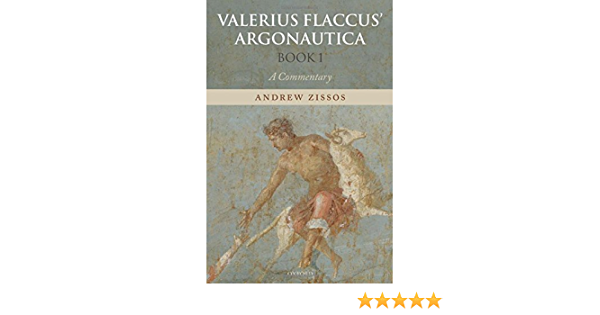
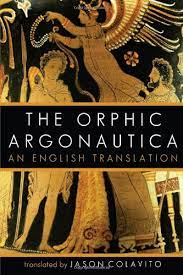
I mean, I could hardly not start the journey with these, could I? The quintessential sources on Jason and his quest for the Fleece, the renditions of the Argonautica were the first books I picked up when planning the outline of Shadow. Apollonius of Rhodes’ version is by far the most well-known and detailed – and, subsequently, the version most authors and retellers use to ‘remix’ the story of Jason – but I think too many people sleep on the other two, lesser-known ones. The Valerius Flaccus version, that came many centuries later, is an interesting reimagining of the quest with Roman instead of Greek values, while the Orphic version (like all the Orphic hymns and poems) gives a hauntingly poetic dimension to the tale, as well as an intriguing differing perspective.
Euripides – Medea

Again, not so much an ‘I ought to…’ but a ‘how could I ever do this justice if I didn’t…’ Everyone’s favourite magic-wielding child-killer plays a pivotal role in the story, defying her (arguably more powerful) tyrannical father to help Jason get his wish, before accompanying him back to Greece in time for a Fatal Attractionesque marital breakdown. And yet, in Apollonius at least, Medea has a disproportionate amount of page time compared to some of the other characters and events. Other parts of her story get told in other places – this play, most obviously, as well as others – though in modern culture, our favourite Colchian witch has a tendency to be reduced to a lovesick cliché (lame) or worse, a cultural template for overemotional scorned women and hysteria (laaaaaaaaaame). I’ve a lot of work to do for Part III of Shadow, but I know for sure that our wonderfully problematic Medea is going to be right at the heart of it.
Also, side note – Rosie Hewlett (of Medusa fame) will be releasing a novel in 2024 that is all about Medea. I’ve talked to her about it, and it’s going to be ace. Buy it when it drops, and thank me later.
Euripides – The Heracles ‘Cycle’

‘Cycle’ is my own term, hence the inverted commas, but it’s worth explaining. Amongst many other masterpieces, Euripides wrote three very important plays about H-bomb himself, which while being pivotal, aren’t the most well-known or well-trumpeted in comparison to his other works: Heracles, Children of Heracles, and Alcestis. Each touches a part of the big man’s life that is similarly pivotal, but also, in comparison to his greatest hits, similarly overlooked. Heracles was a lot more than just the Twelve famous Labours he committed, even if those are the deeds for which he is remembered most for. But a great deal happens in his life, both before and after they take place, that defines him as a person just as much. Heracles visits the darkest day of his life – when Hera drove him mad, making him turn his young children into pincushions with his deadly archery skills and then deal with the fallout.
And Alcestis might actually be my favourite Greek myth – and tragic play – of all time, telling the story of how Heracles returns to meet an old friend grieving the loss of his wife, only to physically beat Death – Death – in a wrestling match, and bring the dead woman’s soul back to the land of the living. Out of Heracles’ many, many adventures the story of Alcestis is honestly my favourite, because of what drives it. We see Heracles complete mighty deed after mighty deed for honour, for the gods, and to fulfil vows and prophecies uncounted. But this is one of the few times he simply steps in and puts his life on the line, with no god or audience to cheer him on. Not even because it is morally right, to challenge the laws and life and death. But because, above all, it is kind. He sees a man in pain, a man he cares about, and fights the embodiment of human death to lift his burden.
And without spoiling too much, it’s a story that has quite a sharp relevance for the events of Shadow…
Hesiod – Theogonies

I’d never really delved into Hesiod much before this project, but this was another text that I didn’t know I’d been waiting for till now. Reading about the origin stories of the gods of Greek mythology – and the gods that came before them, and the gods that came before them – just feels like learning some long-forgotten, long-forbidden secrets. Unlike many recent Greek myth retellings that reimagine the stories as historical fiction, cutting out all the gods and magic in favour of human-centric, human-driven drama, the machinations of the gods are very much a potent force in Shadow, so learning more about the figures behind them was fantastic.
Herakles – Sourcebook (Emma Stafford)

A little deviation from the format here, but I’m including it because it’s worth teaching the lesson. If you want to learn about an Ancient topic (or figure) than a sourcebook is a great way to go. This particular example by Emma Stafford really helped be cut through the baggage of retelling after retelling, and cover so many different contexts and iterations of the same stories.
Sappho/Anne Carson – If Not, Winter

I’ll admit, putting this as Primary is a slight misnomer, as this owes as much to Carson’s reconstruction and reinterpretation as it does to Sappho’s original genius. But I’m standing by it. I came to Sappho embarrassingly late in life, and like every other idiot, I’m bowled over time after time with how she manages to say so much with so little. Fragment 147, in particular, is just something that haunts you for as long as you remember it (and it just gets more tragic the longer you take to consider the context), but like all of her work, it’s the power of the unsaid that makes it so illuminating. Things left unsaid is quite a pervasive theme of Shadow, too, so despite having no relevance to the novel plotwise, I think If Not, Winter definitely counts as an influence.
Roger Lancelyn Green – Tales of the Greek Heroes/The Tale of Troy


Moving on into secondary and starting with a whopper. It’s not an exaggeration to say that these books changed the course of my time on this earth. Our Latin teacher in Year 5 (god, what a privileged way to start a sentence) would read us each a chapter of these books every lesson, from the origins of the Olympians in the first volume to the end of the Heroic age with Odysseus’ tragic death in the second. This was, in essence, my Mythos, my Percy Jackson; the beginning of my fascination with Greek mythology, and from that, the beginning of my willingness to take those lessons more seriously, pick them for GCSE and A Level, apply to and study Classics at Warwick, and from there use that experience to begin the start of my career and adult life. These books influenced how I grew up as a child, a teenager, and ultimately the man I became. Because of them, I ended up in the university I did, and experienced the friendships, relationships and regrets that every 18 year old does as a student. And sure enough, having returned to the Classical world these last few years and taken up writing again, it’s likely that they are going to affect my life going forward.
A rather sobering thought, all things considered.
I still have my prep-school copies of these books – with those exact same covers – and rereading them yet again after so long has been as enjoyable as it has nostalgic. For books that came out in the 50s, they have aged surprisingly well, and while they lack some of the more modern character focus and nuance as more contemporary equivalents do, I think they are going to hold up in ways that more modern retellings may well not. In terms of practicalities, the scope of material they cover is extreme (pretty much every major literary text and drama I can think of, bar a few), but all woven together so deftly and so lightly that you wouldn’t realise you are getting a potted yet informative summary of the entire Greek mythological canon.
Anne Carson – H of H Playbook
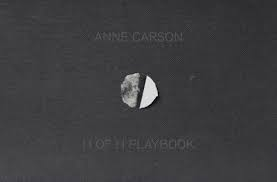
As if any of Anne Carson’s work needs explaining. I can’t really say too much about this without spoiling what’s inside. But this playbook (if you can even call it that) examines and deconstructs the legend of Heracles in a way that transcends time, genre, and even storytelling form. A host of original ‘Heraclesian’ characters show up alongside the big man himself, but for me the shining core of this story (aside from page after page of Carson’s hauntingly beautiful lyricism) is the relationship between Heracles and Theseus. Not a simple relationship, by any means, and certainly not without its ups and downs, but a touching one regardless. Heracles and Theseus’ bond (or what it used to be, at least) is quite an important note in Shadow – even if I took it in a radically different direction from Carson’s – and this playbook was a great help to sketch it out.
Mark Knowles – the Blades of Bronze

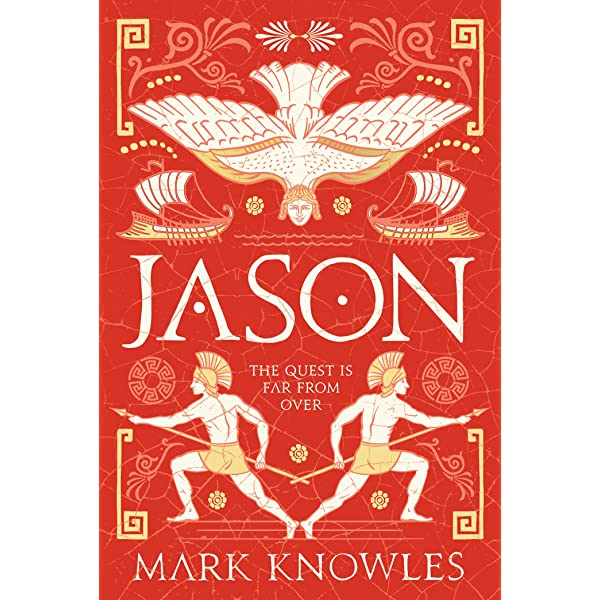
Moving into more straightforward retelling territory now, I can’t continue this post without talking about the only other Golden Fleece retelling that has come out in recent years; the sublime Blades of Bronze series by Mark Knowles. This trilogy, the third of which is set to drop this November, covers the entirety (yes, the entirety – no mean feat, by any man’s reckoning) of Jason’s journey to the Fleece as chronicled by Apollonius, and then his journey back across the sea to Iolchus. Another solid example of a mythological story reimagined as historical fiction, this series so far has given me a very interesting perspective. It was quite informative – and at times surreal – to read another retelling of the same Ancient material, at the very same time I was writing my own.
You may well remember mentioning in my interview with Erica that I don’t think it’s a bad thing to have so many authors rehashing the same myths in modern fiction; far from it, actually, as there is no set ‘canon’ of Greek mythology and retelling after retelling is how the original myths evolved and gained life. I did admittedly go into the first Chapters of Argo at least a little worried that the series was going to steal my thunder, or at least gut any interest in a follow-up story by an author nobody who matters has ever heard of. But honestly, the opposite has been true. Whatever I feel about Blades of Bronze as a reader, as a writer it hasn’t influenced my work in any particularly disruptive way, which kind of highlights my original point with Erica. Essentially, every narrative and stylistic choice Mark made is the opposite of what I’ve done, or was planning to do. And I don’t say that because I think his work is bad, or that my work is bad. But because Greek mythology is so subjective, and every retelling is subjectively different, without being better or worse.
Mark wanted a grand retelling of the quest from start to finish, an ‘epic’ in the truest definition of the word. I wanted a fairly compressed retelling of a few parts of the story instead. Mark wanted a historical narrative dictated by human endeavour. I wanted magic, shenanigans, and gods splitting the sky. Mark wanted a cast of characters bursting at the seams. I wanted to zero in on just a few, and put the rest to one side. Mark wanted a story of a boy becoming a leader. I wanted a story of a legend tired of life. Mark wanted a swashbuckling tale of brave and reckless men, doing daring deeds and being ‘heroic’ in Ancient and modern senses of the word. I wanted to unscrew the nuts and bolts of heroism, and show it off for the hollow sham I find it to be. And most crucially, Mark (for the first book, at least) wanted to adhere to the Ancient source material as respectfully as he could, while I mixed and matched from a plethora of sources, as well as taking some… liberties, as you’ll doubtless discover.
Some people love the Blades of Bronze, and some don’t. Some people may love Shadow when it’s out, and some won’t. Both cover (roughly) the same material, but it would be a monumental leap of logic to suggest they are telling the same story. Neither is any more or less valid than the other.
Though, admittedly, he has an agent and publishing deal, and I don’t. Soooooooooooooooo
Madeline Miller – The Song of Achilles + Circe
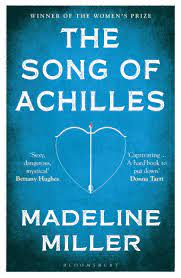

Again… why do I even need to explain this.
There had been plenty of Greek mythology retellings in publishing before Ms Miller came on the scene, that can’t be ignored. By some fairly heavyweight authors, too – Margaret Atwood’s Penelopiad, Christa Wolf’s Cassandra – but it’s safe to say, when The Song of Achilles dropped near on a decade ago, there is a reason why it became the sensation it did. Miller, overnight, blew open a whole new genre of fiction, bringing it into the 21st Century while keeping it so unapologetically Ancient. She set the bar and standard for mythology retellings in so many ways, with the features that we’ve all become spoilt for and have taken for granted in the dozens of novels that have dropped since then; a deeply character-driven approach to storytelling, a focus on the pathos rather than glory of the myths, and a zeroing in on every ounce of humanity and tenderness in a world dominated by falling swords and raging gods.
So many authors before her, and after, caught the glitz of these millenia-old stories. But Madeline Miller was the first one to truly count the tears. Tragedy permeates every page of either of her books, and it’s an often-noted joke that reading either one without a tissue box to hand is an Achillean feat of recklessness. I came to Miller embarrassingly late for a dyed-in-the-wool Classicist; I didn’t read Song until 2020, when I was in the midst of my physiological and emotional low. Just the gut punch I needed. I actually enjoyed Circe more; although it doesn’t have the grabbing power Song does, I found the gods-and-men theme that haunts her work so much more spellbinding from the god’s eye view we have in Circe, rather than the view from the ground in Song.
But still. As Madeline noted in her Author’s Note in the anniversary edition, there is a reason why so many people use lines from Song in their wedding vows, or tattoo them onto their bodies, or slam them up on Tumblr and Instagram. This book, perhaps more than any other in recent times, changed the face of Classics in the modern world. I would know these books by touch alone, by smell. I would know them blind, at the end of the world.

Okay, this one is sorrrrt of a copout, as it isn’t out for another month, and I probably won’t read it for a good while after that anyway.
I’m going to do an about turn and rubbish a great deal of the spiel I gave you in my Blades of Bronze review. Multiple retellings are a good thing in this genre, I stand by that, and there aren’t more genres that are embellished by having more and more voices in the mix, rather than spoilt. But I have to admit, a very small, childish part of me felt a little flummoxed by the impending arrival of Atalanta. Jennifer Saint is a great author – Ariadne wasn’t my cup of tea, personally, but Elektra ranks as one of my favourite retellings of all time – and if Madeline Miller gets the pathos of the Ancient world better than any other, I’d say Jennifer Saint gets the women.
But I have to admit, having grown up loving Roger Lancelyn’s stories about Atalanta, and looking forward to springing one of my favourite, scarcely-known Greek characters into a leading role in Shadow for so long, I did feel a tiny piece of my heart drop when I saw the first press release hit my Facebook feed…
… The same. Damn. Day. I. Started. Writing.
Yep. As you’ll remember from my chat with Erica, this is not an exaggeration. Obviously, this is only from my perspective – traditional publishing works on fairly glacial timescales, and Jennifer had been working on this novel for years before the public ever knew about it, but… damn.
It is a strangely hollow feeling to know, beyond all doubt, that Saint will blow this character into the stratosphere when her book finally drops, and that nothing I do with Atalanta will ever touch the sides of that in any way. But then, in another way, it’s actually oddly liberating. Knowing I’ll never measure up to this book does, in a way, take some of the pressure off writing this character (especially a character that I wanted so desperately to do justice to, and not ruin with male-gaze crappiness or reduce to an inane cliché).
Jokes aside, I have nothing to complain about. Just as is the case with Mark Knowles, nothing Jennifer Saint does with influence my narrative, and vice versa. Both versions of the character will exist, and that won’t change. And what is more, one of my uber-favourite characters in mythology is going to explode out of miscellanea into mainstream fiction, at the helm of one of the genre’s most renowned writers.
I made a promise to myself that I wouldn’t buy Atalanta until I was finished with the first draft of Shadow, to ensure beyond all doubt that nothing of Saint’s work creeps inadvertently into mine. I can tell you, with a level of prescience that would make Tiresias proud, that that promise is going to hold up for all of 30 seconds. Because I’m not going to wait any longer than I have to to get my hands on this bloody book.
Bernard Cornwell – The Warlord Chronicles
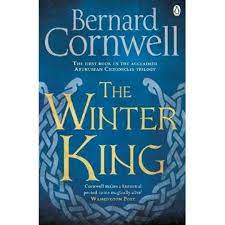

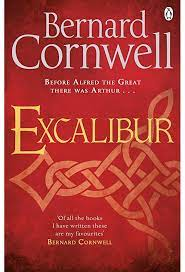
This isn’t even a Classical retelling – it’s a reimagining of the saga of King Arthur, as a Dark Age historical sans-gods thriller. I’m including it here because, quite frankly, it is my favourite book series of all time, and the one series that kicked me almost unwillingly into writing once again.
There are no arguments to be had here. This is simply the gold standard of retelling any historical or mythological story. Perfectly plotted, achingly real characters, and an emotional climax that brings tears to my eyes every time I read it. And I’ve read it a lot of bloody times.
This trilogy has it all. Love, war, the best and worst of humankind, fading memories and grasped hope for the future. It is also, in my opinion, leagues above the much more popular Last Kingdom series it serves as spiritual prequel to, and I’ve never understood why. Uhtred of Bebbanburg is an absolute psychopath. Derfel Cadarn, by contrast, is the apotheosis of man.
A TV series of this is being made by Bad Wolf Productions, and frankly, I follow all updates on it with a growing sense of apprehension. It may be good, it may be great, but it will never equal these books. If you don’t like these books, then we cannot be friends. Quelle dommage.
Fun aside – I met one of Bernard’s ex-agents at a writing class a handful of years ago, who actually told me I reminder her of Bernard. Personally. I’m fairly sure that moment is going to flash before my eyes when my time comes.
Jason and the Argonauts – BBC Miniseries

Bet you thought I wouldn’t put a TV series on here, right?
Wrong.
That same teacher who introduced me to Lancelyn Green showed this series to us on Friday afternoons – not an entirely age-appropriate choice, in hindsight – and hence, it’s etched into my heart with similar tenderness. This series is, objectively, terrible – Jason London is the blandest actor to ever draw breath, Atalanta is reduced to a simpering farm girl love interest, the CGI skeletons hurt my eyes to watch, and the rest of the Argonauts are reborn as a bunch of background extras with no bearing whatsoever to their textual incarnations.
And yet… I can’t help but prefer this to the wholly overrated Ray Harryhausen film. I rediscovered this after almost 15 years on YouTube – grainy, poorly edited, but watchable nonetheless – and I was gratified to recognise so many great actors (Hugh Quarshie, Adrian Lester, Ciaran Hinds, David Calder, Eliot Levey, Derek Jacobi to name but a few) who brought their genuine A-Game to such godawful material. And Brian Thompson, as Heracles, definitely casts a great shadow over… well, Shadow.
I doubt anything I write is going to bear much relation to this overly ambitious but stumbling series. But in honestly, little pieces of it have trickled into my narrative here and there. Be it throwaway lines of dialogue, which get repeated wholesale or perverted and played with (maaaa dessstiny… is to ruuuuuuule…), or just the odd thematic nods and nudges. I would never dream of using this series as conscious inspiration. But unconscious inspiration is another matter entirely…
And There We Have It
Christ.
I think this may be the longest blogpost I’ve ever written – and, in hindsight, one of the most serious and least-self-indulgent. I don’t often deep dive into Classics as a discipline, beyond where it touches my writing, but if I can muster the time and effort I think I may do this more often.
If.
As one final piece of housekeeping, I’ve linked every book and author I’ve mentioned to places where you can buy said work/look at said author’s shtick.
Adios.
